定语、状语从句省略
- 格式:docx
- 大小:27.64 KB
- 文档页数:8
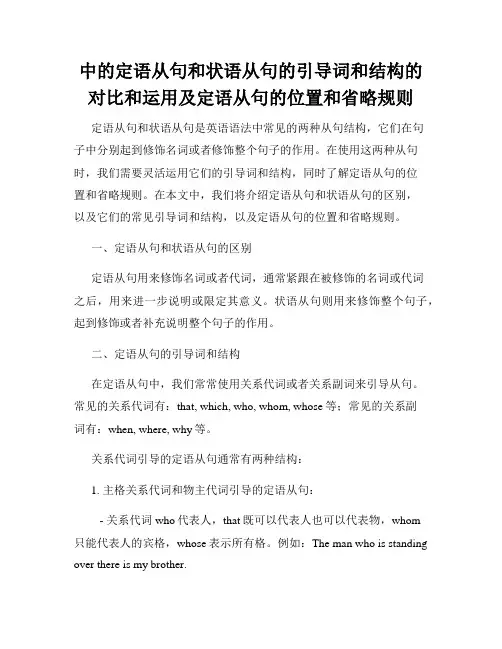
中的定语从句和状语从句的引导词和结构的对比和运用及定语从句的位置和省略规则定语从句和状语从句是英语语法中常见的两种从句结构,它们在句子中分别起到修饰名词或者修饰整个句子的作用。
在使用这两种从句时,我们需要灵活运用它们的引导词和结构,同时了解定语从句的位置和省略规则。
在本文中,我们将介绍定语从句和状语从句的区别,以及它们的常见引导词和结构,以及定语从句的位置和省略规则。
一、定语从句和状语从句的区别定语从句用来修饰名词或者代词,通常紧跟在被修饰的名词或代词之后,用来进一步说明或限定其意义。
状语从句则用来修饰整个句子,起到修饰或者补充说明整个句子的作用。
二、定语从句的引导词和结构在定语从句中,我们常常使用关系代词或者关系副词来引导从句。
常见的关系代词有:that, which, who, whom, whose等;常见的关系副词有:when, where, why等。
关系代词引导的定语从句通常有两种结构:1. 主格关系代词和物主代词引导的定语从句:- 关系代词who代表人,that既可以代表人也可以代表物,whom只能代表人的宾格,whose表示所有格。
例如:The man who is standing over there is my brother.- 关系代词which代表物,that既可以代表人也可以代表物,whose表示所有格。
例如:The book which is on the table is mine.2. 宾格关系代词引导的定语从句:- 关系代词whom代表人的宾格。
例如:He invited the girl whom I met yesterday to the party.- 关系代词which代表物。
例如:I bought the car which he recommended.关系副词引导的定语从句可以表示时间、地点、原因、方式等。
例如:I still remember the day when we first met.三、状语从句的引导词和结构状语从句的引导词通常有连词和从属连词,用来引导表达时间、地点、原因、条件、目的等不同的状语从句。
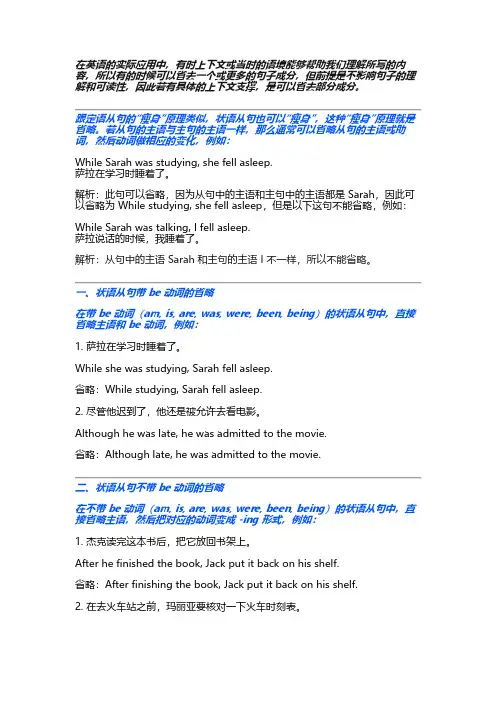
在英语的实际应用中,有时上下文或当时的语境能够帮助我们理解所写的内容,所以有的时候可以省去一个或更多的句子成分,但前提是不影响句子的理解和可读性,因此若有具体的上下文支撑,是可以省去部分成分。
跟定语从句的“瘦身”原理类似,状语从句也可以“瘦身”,这种“瘦身”原理就是省略。
若从句的主语与主句的主语一样,那么通常可以省略从句的主语或助词,然后动词做相应的变化,例如:While Sarah was studying, she fell asleep.萨拉在学习时睡着了。
解析:此句可以省略,因为从句中的主语和主句中的主语都是 Sarah,因此可以省略为 While studying, she fell asleep,但是以下这句不能省略,例如:While Sarah was talking, I fell asleep.萨拉说话的时候,我睡着了。
解析:从句中的主语 Sarah 和主句的主语 I 不一样,所以不能省略。
一、状语从句带 be 动词的省略在带 be 动词(am, is, are, was, were, been, being)的状语从句中,直接省略主语和 be 动词,例如:1. 萨拉在学习时睡着了。
While she was studying, Sarah fell asleep.省略:While studying, Sarah fell asleep.2. 尽管他迟到了,他还是被允许去看电影。
Although he was late, he was admitted to the movie.省略:Although late, he was admitted to the movie.二、状语从句不带 be 动词的省略在不带 be 动词(am, is, are, was, were, been, being)的状语从句中,直接省略主语,然后把对应的动词变成 -ing 形式,例如:1. 杰克读完这本书后,把它放回书架上。
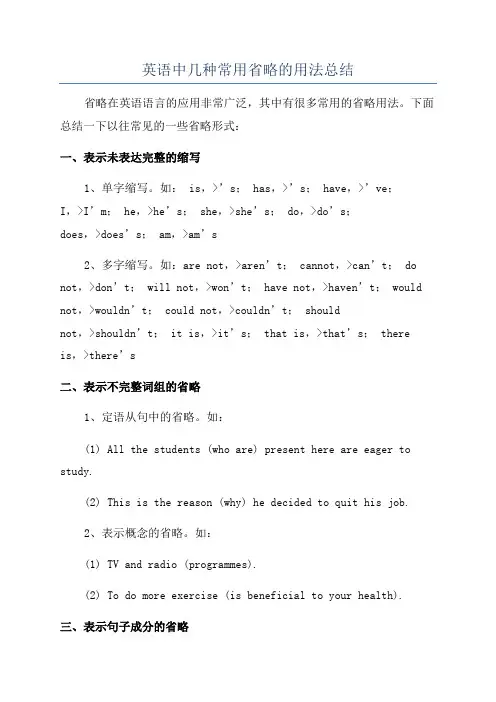
英语中几种常用省略的用法总结省略在英语语言的应用非常广泛,其中有很多常用的省略用法。
下面总结一下以往常见的一些省略形式:一、表示未表达完整的缩写1、单字缩写。
如: is,>’s; has,>’s; have,>’ve;I,>I’m; he,>he’s; she,>she’s; do,>do’s;does,>does’s; am,>am’s2、多字缩写。
如:are not,>aren’t; cannot,>can’t; do not,>don’t; will not,>won’t; have not,>haven’t; would not,>wouldn’t; could not,>couldn’t; shouldnot,>shouldn’t; it is,>it’s; that is,>that’s; there is,>there’s二、表示不完整词组的省略1、定语从句中的省略。
如:(1) All the students (who are) present here are eager to study.(2) This is the reason (why) he decided to quit his job.2、表示概念的省略。
如:(1) TV and radio (programmes).(2) To do more exercise (is beneficial to your health).三、表示句子成分的省略1、宾语的省略。
如:(1) I like to read (books).(2) He gave me an answer (to my question).2、表语的省略。
如:(1) He is a teacher (of English).(2) The weather today is (very) hot.3、主语的省略。
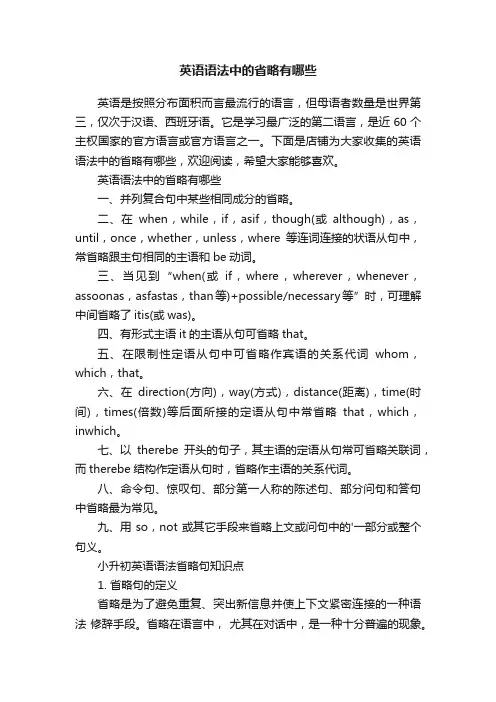
英语语法中的省略有哪些英语是按照分布面积而言最流行的语言,但母语者数量是世界第三,仅次于汉语、西班牙语。
它是学习最广泛的第二语言,是近60个主权国家的官方语言或官方语言之一。
下面是店铺为大家收集的英语语法中的省略有哪些,欢迎阅读,希望大家能够喜欢。
英语语法中的省略有哪些一、并列复合句中某些相同成分的省略。
二、在when,while,if,asif,though(或although),as,until,once,whether,unless,where等连词连接的状语从句中,常省略跟主句相同的主语和be动词。
三、当见到“when(或if,where,wherever,whenever,assoonas,asfastas,than等)+possible/necessary等”时,可理解中间省略了itis(或was)。
四、有形式主语it的主语从句可省略that。
五、在限制性定语从句中可省略作宾语的关系代词whom,which,that。
六、在direction(方向),way(方式),distance(距离),time(时间),times(倍数)等后面所接的定语从句中常省略that,which,inwhich。
七、以therebe开头的句子,其主语的定语从句常可省略关联词,而therebe结构作定语从句时,省略作主语的关系代词。
八、命令句、惊叹句、部分第一人称的陈述句、部分问句和答句中省略最为常见。
九、用so,not或其它手段来省略上文或问句中的'一部分或整个句义。
小升初英语语法省略句知识点1. 省略句的定义省略是为了避免重复、突出新信息并使上下文紧密连接的一种语法修辞手段。
省略在语言中,尤其在对话中,是一种十分普遍的现象。
2.小品词的省略1)省略介词I ‘ ve studied English (for) five years. 我已学五年英语了。
2)省略连词thatI believe (that) you will succeed . 我相信你们会成功的。
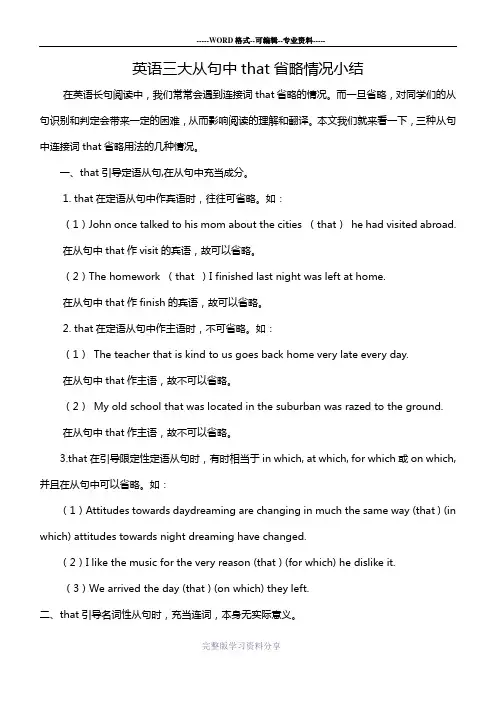
英语三大从句中that省略情况小结在英语长句阅读中,我们常常会遇到连接词that省略的情况。
而一旦省略,对同学们的从句识别和判定会带来一定的困难,从而影响阅读的理解和翻译。
本文我们就来看一下,三种从句中连接词that省略用法的几种情况。
一、that引导定语从句,在从句中充当成分。
1. that在定语从句中作宾语时,往往可省略。
如:(1)John once talked to his mom about the cities (that)he had visited abroad.在从句中that作visit的宾语,故可以省略。
(2)The homework (that )I finished last night was left at home.在从句中that作finish的宾语,故可以省略。
2. that在定语从句中作主语时,不可省略。
如:(1)The teacher that is kind to us goes back home very late every day.在从句中that作主语,故不可以省略。
(2)My old school that was located in the suburban was razed to the ground.在从句中that作主语,故不可以省略。
3.that在引导限定性定语从句时,有时相当于in which, at which, for which或on which, 并且在从句中可以省略。
如:(1)Attitudes towards daydreaming are changing in much the same way (that ) (in which) attitudes towards night dreaming have changed.(2)I like the music for the very reason (that ) (for which) he dislike it.(3)We arrived the day (that ) (on which) they left.二、that引导名词性从句时,充当连词,本身无实际意义。
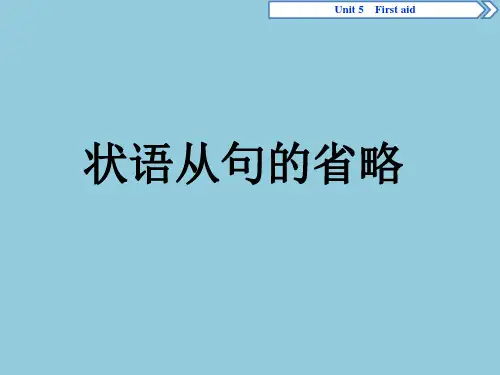
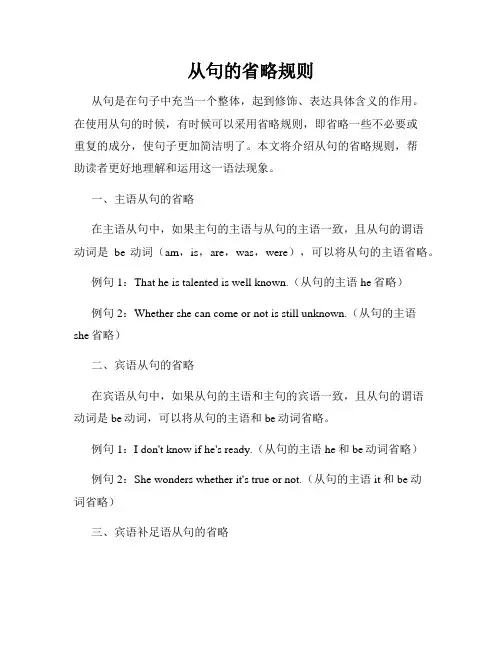
从句的省略规则从句是在句子中充当一个整体,起到修饰、表达具体含义的作用。
在使用从句的时候,有时候可以采用省略规则,即省略一些不必要或重复的成分,使句子更加简洁明了。
本文将介绍从句的省略规则,帮助读者更好地理解和运用这一语法现象。
一、主语从句的省略在主语从句中,如果主句的主语与从句的主语一致,且从句的谓语动词是be动词(am,is,are,was,were),可以将从句的主语省略。
例句1:That he is talented is well known.(从句的主语he省略)例句2:Whether she can come or not is still unknown.(从句的主语she省略)二、宾语从句的省略在宾语从句中,如果从句的主语和主句的宾语一致,且从句的谓语动词是be动词,可以将从句的主语和be动词省略。
例句1:I don't know if he's ready.(从句的主语he和be动词省略)例句2:She wonders whether it's true or not.(从句的主语it和be动词省略)三、宾语补足语从句的省略在宾语补足语从句中,如果从句的主语和主句的宾语补足语一致,且从句的谓语动词是be动词,可以将从句的主语和be动词省略。
例句1:They elected him chairman, which was a wise choice.(从句的主语which和be动词省略)例句2:We made her the team captain, which turned out to be a mistake.(从句的主语which和be动词省略)四、定语从句的省略在定语从句中,当从句的主语和关系代词或关系副词引导的介词宾语一致时,可以将从句的主语和关系代词或关系副词省略。
例句1:The book I borrowed from the library is very interesting.(从句的主语I省略)例句2:The girl I saw at the party is my best friend.(从句的主语I省略)五、状语从句的省略在状语从句中,当从句的主语和主句的主语一致,且从句的谓语动词是be动词,可以将从句的主语和be动词省略。
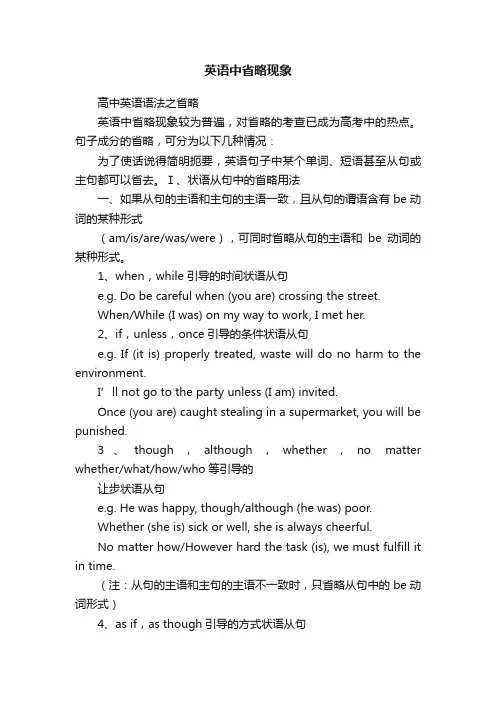
英语中省略现象高中英语语法之省略英语中省略现象较为普遍,对省略的考查已成为高考中的热点。
句子成分的省略,可分为以下几种情况:为了使话说得简明扼要,英语句子中某个单词、短语甚至从句或主句都可以省去。
Ⅰ、状语从句中的省略用法一、如果从句的主语和主句的主语一致,且从句的谓语含有be动词的某种形式(am/is/are/was/were),可同时省略从句的主语和be动词的某种形式。
1、when,while引导的时间状语从句e.g. Do be careful when (you are) crossing the street.When/While (I was) on my way to work, I met her.2、if,unless,once引导的条件状语从句e.g. If (it is) properly treated, waste will do no harm to the environment.I’ll not go to the party unless (I am) invited.Once (you are) caught stealing in a supermarket, you will be punished.3、though,although,whether,no matter whether/what/how/who等引导的让步状语从句e.g. He was happy, though/although (he was) poor.Whether (she is) sick or well, she is always cheerful.No matter how/However hard the task (is), we must fulfill it in time.(注:从句的主语和主句的主语不一致时,只省略从句中的be动词形式)4、as if,as though引导的方式状语从句e.g. He rubbed his eyes and yawned as if/though (he was) waking up after along sleep.He stood up as if/though (he wanted) to leave.(as if/though + to do表示一个将来的动作)二、than,as引导的比较状语从句中的省略用法:当不同的主语进行比较时,一般省略从句中的谓语;当从句中的主语与谓语(be动词除外)和主句中的主语与谓语相同时,通常省略从句中的主语和谓语,只保留比较部分。
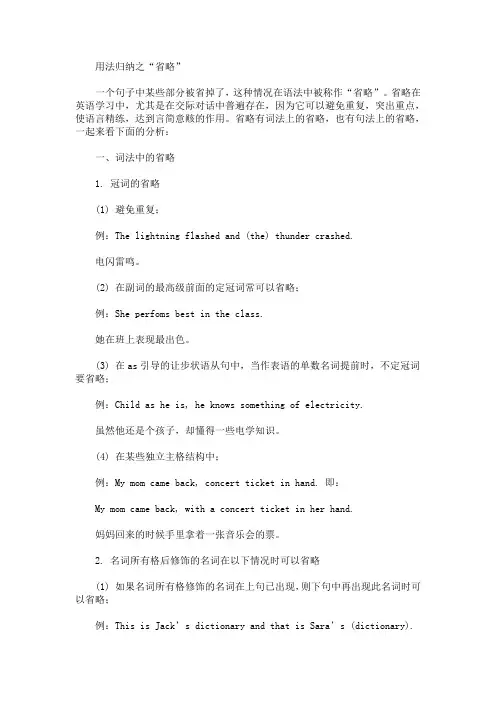
用法归纳之“省略”一个句子中某些部分被省掉了,这种情况在语法中被称作“省略”。
省略在英语学习中,尤其是在交际对话中普遍存在,因为它可以避免重复,突出重点,使语言精练,达到言简意赅的作用。
省略有词法上的省略,也有句法上的省略,一起来看下面的分析:一、词法中的省略1. 冠词的省略(1) 避免重复;例:The lightning flashed and (the) thunder crashed.电闪雷鸣。
(2) 在副词的最高级前面的定冠词常可以省略;例:She perfoms best in the class.她在班上表现最出色。
(3) 在as引导的让步状语从句中,当作表语的单数名词提前时,不定冠词要省略;例:Child as he is, he knows something of electricity.虽然他还是个孩子,却懂得一些电学知识。
(4) 在某些独立主格结构中;例:My mom came back, concert ticket in hand. 即:My mom came back, with a concert ticket in her hand.妈妈回来的时候手里拿着一张音乐会的票。
2. 名词所有格后修饰的名词在以下情况时可以省略(1) 如果名词所有格修饰的名词在上句已出现,则下句中再出现此名词时可以省略;例:This is Jack’s dictionary and that is Sara’s (dictionary).这本是杰克的词典,那本是萨拉的词典。
(2) 名词所有格后修饰的名词如果是指诊所、住宅、商店等地点时,这些名词也常省略;例:at the doctor’s 在诊所at Mr. Wright’s 在怀特先生家3. 介词的省略(1) both后常跟of的介词短语,其后可以接名词复数形式,也可以接代词宾格复数形式。
接复数名词时,介词of可以省略,但接代词宾格时,of不能省略;例:Both the teachers often answer the questions.这两个老师都常常解答问题。
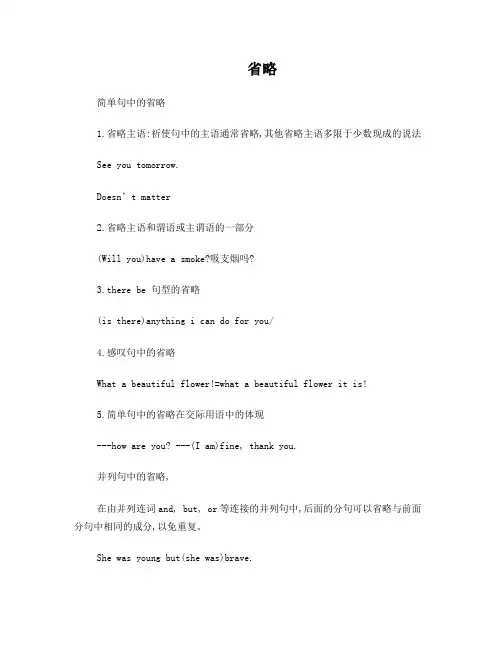
省略简单句中的省略1.省略主语:祈使句中的主语通常省略,其他省略主语多限于少数现成的说法See you tomorrow.Doesn’t matter2.省略主语和谓语或主谓语的一部分(Will you)have a smoke?吸支烟吗?3.there be 句型的省略(is there)anything i can do for you/4.感叹句中的省略What a beautiful flower!=what a beautiful flower it is!5.简单句中的省略在交际用语中的体现---how are you? ---(I am)fine, thank you.并列句中的省略,在由并列连词and, but, or等连接的并列句中,后面的分句可以省略与前面分句中相同的成分,以免重复。
She was young but(she was)brave.复合句中的省略1.状语从句中的省略(1)当状语从句的主语和主句的主语一致或主语是it时,从句的主语和谓语部分的be动词可以省略。
He opened his lips as if (he were)to speak.The exhibition is more interesting than (it was) expected.(2)含有if 的省略结构有:Error , if (there are)any,should be corrected.如果有的话Get up early tomorrow, if not(if you don’t get up early), you will miss the first bus.如果不的话Come tomorrow,if possible.如果可能的话I will buy a TV set if necessary.如果有必要的话If so, you must go at once.如果这样的话(3)If虚拟条件句中有should/had/were时,if可以省略,从句中的主谓要倒装Were they here now, they could help us.=If they were here now, they could help us.如果现在他们在这里,他们会帮助我们。
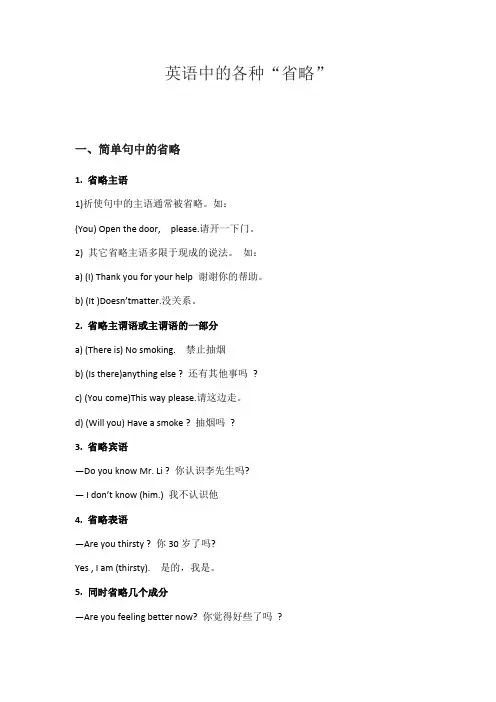
英语中的各种“省略”一、简单句中的省略1. 省略主语1)祈使句中的主语通常被省略。
如:(You) Open the door,please.请开一下门。
2) 其它省略主语多限于现成的说法。
如:a) (I) Thank you for your help 谢谢你的帮助。
b) (It )Doesn’tmatter.没关系。
2. 省略主谓语或主谓语的一部分a) (There is) No smoking.禁止抽烟b) (Is there)anything else ? 还有其他事吗?c) (You come)This way please.请这边走。
d) (Will you) Have a smoke ? 抽烟吗?3. 省略宾语—Do you know Mr. Li ? 你认识李先生吗?—I don’t know (him.) 我不认识他4. 省略表语—Are you thirsty ? 你30岁了吗?Yes , I am (thirsty).是的,我是。
5. 同时省略几个成分—Are you feeling better now? 你觉得好些了吗?—(I am feeling ) Much better(now) 好多了。
(I wish) Good luck (to you) .祝你好运/祝你顺利。
二. 并列复合句中的省略在并列句中后边的分句可以省略与前边分句中相同的成分。
如:a) The boy picked up a coin in the road and (the boy ) handed it to a policeman.这个男孩在马路上拾起一枚硬币并把他交给了警察。
b) Your advice made me happy but(your advice made) Tom angry .你的建议使我高兴但使汤姆生气。
c) Tom must have been playing basketball and Mary (must have been)doing her homework.汤姆肯定一直在打篮球,玛丽一直在写作业。
状语从句和定语从句的用法对比状语从句和定语从句是英语语法中的两个重要子句结构,它们在句子中分别充当状语和定语的作用。
本文将对这两种从句进行详细比较和探讨。
一、状语从句的用法状语从句是在复合句中充当状语的子句结构。
它可以表示时间、地点、目的、原因、条件等多种状语关系。
状语从句一般由从属连词引导,如when,where,because,if等。
下面是一些常见的状语从句的用法和例句:1. 时间状语从句:表示主句的动作发生的时间,常用从属连词when,while,before,after等引导。
例如:- He always goes to bed early when he feels tired.(当他感到疲倦时,他总是早睡。
)- They will have a party after they finish their exams.(他们考完试后将举行一个派对。
)2. 地点状语从句:表示主句的动作发生的地点,常用从属连词where引导。
例如:- He likes to go to the park where he can enjoy nature.(他喜欢去公园,在那里他可以享受大自然。
)3. 原因状语从句:表示引起主句动作的原因,常用从属连词because,since,as等引导。
例如:- They couldn't come to the party because they were busy.(因为他们很忙,所以不能参加派对。
)4. 目的状语从句:表示主句动作的目的,常用从属连词so that,in order that引导。
例如:- He studies hard so that he can get a good grade.(他努力学习,以便能得到一个好成绩。
)5. 条件状语从句:表示在什么条件下主句的动作才会发生,常用从属连词if,unless,provided等引导。
例如:- If it rains tomorrow, we will stay at home.(如果明天下雨,我们会呆在家里。
定语从句与状语从句的区别定语从句和状语从句是复合句中常见的两种从句结构。
它们在句子中分别充当定语和状语,用来修饰名词或描述动词的动作情况。
但是,它们在功能和用法上存在一些差异。
本文将重点介绍定语从句和状语从句的区别。
一、定语从句定语从句是修饰名词或代词的从句,以定语的形式出现在句子中。
它通常被用来对名词进行进一步的解释、补充或限定,从而增加句子的信息量。
1. 修饰范围:定语从句修饰的是具体的名词或代词。
例句1:The book that I bought yesterday is very interesting.(我昨天买的那本书非常有趣。
)例句2:The girl who is playing the piano is my sister.(正在弹钢琴的那个女孩是我的姐姐。
)2. 引导词:常用的引导词包括关系代词that, which, who, whom, whose等。
引导词在定语从句中起连接作用,指代先行词,并引导其修饰的从句。
例句3:The car that he bought is expensive.(他买的那辆车很贵。
)例句4:The house where they live is big.(他们住的那所房子很大。
)3. 省略:当定语从句中的主语和主句的主语或宾语相同时,可以省略主语。
例句5:The boy (who/that) I met yesterday is my classmate.(昨天我遇到的那个男孩是我的同学。
)例句6:The apples (which/that) I bought are delicious.(我买的那些苹果很好吃。
)4. 限定性和非限定性定语从句:定语从句可以分为限定性定语从句和非限定性定语从句。
限定性定语从句对先行词进行了必要的限制,如果省略会改变句子的意思,而非限定性定语从句只是对先行词进行补充说明,如果省略不影响句子的整体意思。
限定性定语从句示例:The woman who is talking to the teacher is my mother.(正在和老师交谈的那个女人是我妈妈。
省略句的常见形式与解析在英语语法中,省略句是指在句子中省略掉某些成分,但仍能通过上下文来理解其完整的意思。
省略句的使用可以简化句子结构,增加语言的流畅性和简洁性。
本文将介绍省略句的常见形式以及相应的解析方法。
一、主语省略句在一些情况下,句子的主语可以被省略。
通常情况下,主语可以通过上下文中的其他信息来推断出来。
例1:(完整句) Tom is playing basketball.(省略句) Playing basketball.解析:由于上文提到Tom正在打篮球,所以在这个省略句中可以省略掉主语,仅保留动词"playing"来表达完整的意思。
例2:(完整句) She sings beautifully.(省略句) Sings beautifully.解析:由于上文提到的人称代词"She"已经明确了主语,所以在这个省略句中可以省略掉具体的主语。
二、谓语省略句在一些情况下,句子的谓语可以被省略。
这种省略形式多见于短语或句型中,通过上下文就可以理解其意思。
例1:(完整句) He can play the guitar, but I can't.(省略句) He can play the guitar, but I can't play (the guitar).解析:在这个省略句中,通过上文提到的主题"play the guitar",可以省略掉谓语"Not",而保留上文中的句意。
例2:(完整句) John lives in New York, and Mary in Los Angeles.(省略句) John lives in New York, and Mary in Los Angeles.解析:在这个省略句中,由于谓语"lives"已经在上文中出现过,因此可以省略掉后面的谓语,仅根据上下文理解出Mary的具体情况。
省略结构
1.省略的前提条件是必须保持句子意思的完成无缺,不能引起争议和歧义
2.省略往往是为了避免重复,可以承接前面的内容省略(承前省略),有的可以承接后文的内容省略(后指省略)。
He is not only a teacher of English, but also of Chinese. (of 前省略了a teacher)
3.省略的部分要能够“还原”,还原后语法上要求结构对应,逻辑关系正确。
4.定语从句的省略
5.状语从句的省略
标准书面语中,状语从句的省略:表示转折、时间、条件的连词+ 形容词短语/分词短语
错误形式:连词+ 介词短语/名词短语
特例:once 可以加介词短语/名词短语,whatever 可以加名词短语构成状语从句省略。
IF+
6.比较结构中的省略
7.并列结构中的省略
1)省略相同的主语,宾语,连系动词,助动词和情态动词
2)两个句子并列,第一个句子含有be 动词或者become, 第二个句子中的be 动词或become 必须省略,同时,一些重复的名词或形容词也必须省略。
8.习惯性省略
As needed; as planned; as required; as scheduled
Whenever necessary/needed/possible; wherever necessary/needed/possible than ever; than before; than ever before; than usual; than expected;。
长难句中省略情况归纳来源:文都图书长难句之所以难于理解,有的时候是因为从句、句型等原因,有的则是因为省略的原因。
在英语的长难句中,就常常会出现省略的情况,不了解这些省略,我们分析起长难句就有些困难。
所以,在这里就分享一下省略情况的内容。
在长难句中,经常出现的省略情况,主要有以下几种:第一种:在单句中省略。
有省主语:(We’ve) Got to go now;省略谓语或谓语的一部分:(Is)The machine still not working;省略宾语Which of them is the better choice?-Well, it’s hard to say (it).;省略主语和谓语(或谓语的一部分),只剩下表语、宾语、状语或其他成分What a pity (it is) you can’t go to the lecture.还有省略不定式、省略冠词等等。
第二种:在并列句中省略。
在并列结构中,如果后半句出现and, but, neither, either, nor, so, too时,后一分句与前一分句相同的部分可以省略。
例:Charlie McCreevy, a Europeancommissioner, warned the IASB that it did “not liv e in a political vacuum”but “in the real world ”and that Europe could yet develop different rule s. 在该句中谓语动词warn后接两个并列的that引导的宾从。
第一个从句中使用了not…but…”不是…而是…”句型,but后省略了与not后相同的动词live.第三种:不定式符号to后的省略。
有些动词比如afford, hate,have, hope, intend等之后,to往往省略动词,以免重复。
第四种:此外在状语从句中的省略情况,由whenever, whatever, wherever, however, no matter how/ what/when/where以及whether…or等引导的状语从句,也常常发生省略情况。
高中英语常省引导词的几种从句情况作者:罗红英来源:《中学教学参考·语英版》2009年第03期英语中能省略引导词的从句常有宾语从句、定语从句、状语从句和固定句型等几种:一、引导宾语从句的连词that的省略情况:当及物动词和一些形容词后只跟一个简单的宾语从句,且从句中主语、表语、宾语等成分都不缺,整个从句也不存在任何疑义时,从句只能用that引导,此种情况下经常省引导词that。
例如:(1) I want to know (that) the news is true. 我想知道那消息是真的。
(2) The woman was very glad (that) she could see her lost son again. 那妇女很高兴又可见到自己已失踪的儿子。
二、定语从句省略引导词的情况一般有以下两种:1.当先行词在定语从句中作宾语时,引导从句的关系代词that(指人或指物),whom(指人),which(指物)可以省略。
例如:(1)I know the girl (whom/that) you talked with just now.我认识你刚才和她谈话的那个女孩。
指人的先行词the girl 在定语从句中作介词with 的宾语,其关系代词whom或that 就可以省略不写。
(2) He lives in the beautiful town (which/that) you visited last year. 他就住在你去年参观过的那个美丽的小镇。
指物的先行词the beautiful town 在定语从句中作及物动词visited 的宾语,所以其关系代词which或that可以省略。
2.名词reason 和the way 在定语从句中作状语时,引导定语从句的关系副词why和that可以省略。
例如:(1)The mother didn’t want to listen to the reason (why) his son was late for school.这位母亲不想听她儿子上学迟到的原因。
定语从句省略1. 关系词充当从句的宾语的时候,可以直接省略,而从句不发生任何形式的改变。
This is the right book that you are looking for. = This is the right book you are looking for.2. 关系词充当从句的主语时,如果谓语结构为实词,将关系代词进行省略,而从句中的实词要发生形式的改变。
如果原本从句是一个主动语态,可以将动词直接变成ing形式。
如果原本谓语动词是一个被动语态,可以直接保留过去分词。
如Fruit that contains VC can relieve a cold.=Fruit containing VC can relievea cold.3.如果谓语结构为be+名词,这时,可以将be动词同时省略,将后面的名词和前面从句所修饰的名词构成同位语结构。
如I know Lucy who is the leader of the team.= I know Lucy, the leader of the team.4. 3.先行词为the way, 后面的关系代词可以是that, in which或者是不加任何关系代词。
如:I like the way you talk.5. 直接用于介词后作宾语的关系代词which不能换成that,直接用于介词后作宾语的关系代词whom不能换成who。
但若介词用于句末,则用作宾语的which, whom也可换成that, who6.(1)which用于下列情况:( I )如果引导的是非限定性定语从句; (II)关系代词充当介词的宾语,且介词位于关系代词之前;(III)先行词本身是that等。
(2)that用于下列情况:( I ) 先行词是all, everything, anything, nothing, little, much等不定代词;(II)先行词被all, any, every, no, little, much, some等词修饰;(III)先行词被序数词、形容词最高级修饰或先行词本身是序数词;(IV)先行词被the only, the very(正是、恰是),the last修饰;(V)先行词中既有人也有物;(VI)在which或who的特殊疑问句中含有定语从句等。
另外需要注意:先行词是the way,并在定语从句充当状语时,关系代词用that或省略,若用which,其前加介词in。
疑问:This was the house in which they lived last year.是否存在这种方式并正确——This was the house that they lived in last year.7.当关系词在从句中充当主语时,可以省略,后面的动词发生形式变化——主动语态时,动词变成-ING形式被动语态时,动词保留过去分词形式I know the girl who comes from BJ.I often like reading short novels which were written by Hemingway.I often like reading short novels written by Hemingway.I raise a dog which is named KING.* I raise a dog named KING.I believe the candidate who made the speech in the assembly yesterday is sure to win the support.*I believe the candidate making the speech in the assembly yesterday is sure to win the support.I know the boy who was praised by the teacher.The book which is related to the development has been published recently.They lived in a house facing the south.= They lived in a house which faced the south.The workers working in the factory are well-paid.= The workers who work in the factory are well-paid.= The workers who are working in the factory are well-paid.The tie worn by our head was made in Shanghai.= The tie which is worn by our head was made in Shanghai.The book written by Wang sells well.= The book which was written by Wang sells well.状语从句省略1. 主句和从句的主语保持一致,称为分词作状语;省略从句的主语,将后面的动词发生形式变化,主动语态变成ing形式,若是被动语态,则变为ed形式2. 如前后主语不一致,则称为独立主格结构。
省略方式:关系词(可保留)+动词形式变化(ing\-ed)。
Because mum was ill,I didn't go to school.----Mum being ill,I didn't go to school.When he finished his homework,we went out to play.—-He finishing his homework,we went out to play.一、时间状语从句中的省略When (she was) very young, she began to learn to play the piano. 她很小时,就开始学习弹钢琴。
While (I was) at college, I began to know him, a strange but able student. 我在上大学时就开始认识他,一个奇怪但有能力的学生。
When arriving, send me a telegram. (When you arrive, send me a telegram.) 到达之后,来个电报。
Before leaving, turn off all the lights. (Before you leave, turn off all the lights.) 走之前,请关闭所有的灯。
Don’t come in until (you are) asked to.不叫你请你不要进来。
Whenever (it is )possible, you should come and help. 不管什么时候只要有可能就来帮忙。
You should let us know the result as soon as(it is) possible. 你应尽快让我们知道结果。
注:as在引导时间状语从句时,没有这种省略现象。
我们不可说As walking, she found a nice shining thing on the ground.二、地点状语从句中的省略地点状语从句的省略常用下列结构:where(ver) possible, where(ver) necessary,Lay these books where possible you can find them easily. 把这些书放在你可能容易找到的地方。
Put in articles wherever necessary in the following passages. 在下列文章中需要的地方填入冠词。
三、条件状语从句中的省略常用的句型是:if necessary, if possible, if true, if anyone等。
如:Send the goods now if (they are) ready. 货物如果准备好了,请送过来。
He will come if (he is) asked. 如果叫他来,他就来。
If (it is) necessary, ring me at home. 如果有可能,朝我家里打电话。
Come along with me if (it is) possible. 如果有可能和我一起去吧.。
If (it is) true, this will casue us a lot of trouble. 如果是真的,这会给我们带来很多麻烦。
There are few people nowadays, if (there are) any, who remember him. 很少有人能记起他。
黑夜笼罩大地,谁也看不清远处黑压压的一片是什么东西。
There being no bus, we had to walk home.由于没有公共汽车,我们只好走回家。
2. 名词(代词)+过去分词The workers worked still harder, their living conditions greatly improved.由于工人们的生活条件大大提高,他们工作得更起劲了。
He was listening attentively in class, his eyes fixed on the blackboard.他上课专心听讲,眼睛紧盯着黑板。
3. 名词(代词)+不定式在“名词/代词+动词不定式”结构中,动词不定式和它前面的名词或代词如果存在着逻辑上的主谓关系,动词不定式则用主动的形式;如果是动宾关系,则用被动形式。
The four of us agreed on a division of labor, each to translate a quarter of the book.我们四人同意分工干,每人翻译全书的四分之一。
Many trees, flowers, and grass to be planted, our newly-built school will look even more beautiful.种上许多的树、花和草后,我们新建的学校看上去将更美。
4. 名词(代词)+形容词The Trojans asleep, the Greek soldiers crept out of the hollow wooden horse.特洛伊人睡着了,于是希腊士兵从中空的木马里悄悄爬了出来。